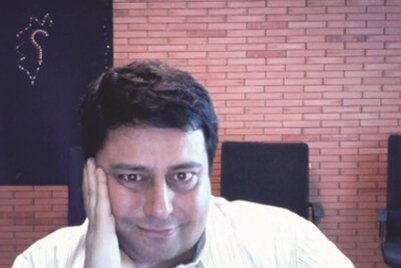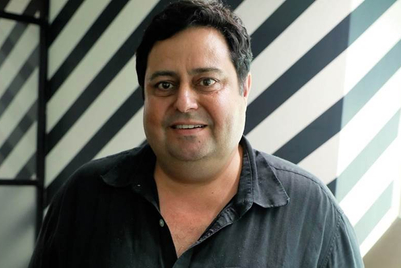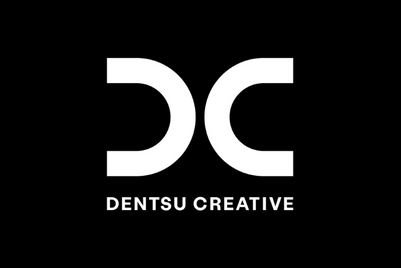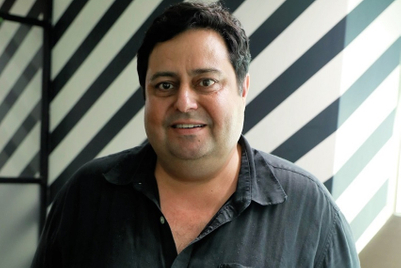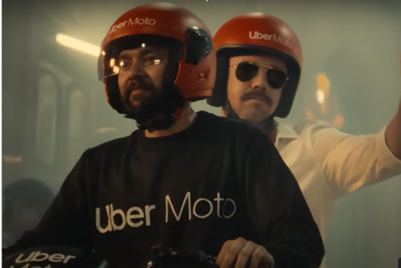
What inspired you to get into advertising?
A friend told me that his cousin was in advertising, and earns a lot of money doing it. I had just finished engineering and thought this was something that I could be reasonably decent at. I met him - Pandrang Row, a creative director. He advised me that instead of going and taking a copy test, I should make a mock portfolio and combine forces with somebody who is starting out as an art director. I did. The creative directors liked the effort that was put into it. I got a job at almost every agency I went to.
You meet people in advertising that you don’t meet anywhere else and there seems to be a decent living to be made out of it. When I joined advertising, in 1994-95, it used to be one of the higher paid professions unlike the state it is in today.
How has the journey been so far?
I started with Rediffusion, Bangalore. So far, I have worked in only four agencies. My boss from Rediffusion, Harshad Sharma, was shifting to Saatchi in Bombay, and asked me to come to Bombay. I said that living in Bombay is very expensive and you are paying me Rs 3,000. He told me to stay with him. So I did. That’s where my career actually started off. Bangalore was a very laid back place. I was in Rediffusion for less than a year.
Bombay was a fantastic experience. We used to do one small 60 cc press add in 10 days in Bangalore but in Bombay, we would be doing an entire campaign. We would be working simultaneously on three campaigns with three servicing people chasing you with radio, film, press, outdoor. It taught me a lot. I had to move back to Bangalore because my dad wasn’t keeping too well. Then in 2001, I shifted to Delhi and have been here ever since. I have enjoyed the journey, it has been great fun.
You came back to Ogilvy for a second stint…
You would be foolish to not come back to Ogilvy. I was working in Rediffusion and my life didn’t seem to be going anywhere and I was thinking of what to do next. I was coming back from a meeting when the phone buzzed and I looked at it. It said ‘Piyush Pandey’. I was sure he wasn’t calling to wish me as it was not my birthday or Diwali or Christmas; it was no occasion at all.
Ogilvy is a fabulous place. I have enjoyed my two stints here over ten and a half years. It’s been a brief interlude of about two to two and a half years before coming back to Ogilvy. I have worked in two cities in McCann - Bangalore and Bombay.
Which brands have you enjoyed working on most?
I did the first ever commercial for Levi’s in India with John Abraham, which probably was his first commercial too. We shot it with the Late Shamin Desai in the ’90s. It had that remix of the song ‘Jaane jaa, dhoondta fir raha’. It was a huge hit and the commercial did well too.
I think the most satisfying was the Polio campaign I did along with Piyush (Pandey) starring Mr. Bacchan and other celebrities such as Shahrukh Khan, Jaya Bacchan, Sachin Tendulkar, Aishwariya Rai. I wrote ‘Do boond zindagi ki’. The communication helped in a very big way to eradicate polio in the country.
Then the two liquor brands coincidently that I have built along with my then partner -- Blenders Pride and Royal Stag Whiskey. Blenders Pride brand was going to shut down because Royal Challenge was beating them in the market. We did this whole thing of basing the entire campaign on fashion with the pre-existing baseline ‘Taste that speaks for itself’ with very fashionable models and high-end layouts. It really revived the brand.
For Royal Stag, I came up with the base line ‘Make it large’. It became a big hit and the brand hasn’t looked back since then. Even after I quit, they have used the same line; the brand has been consistent.
Voltas is another. We created this character called Murthy. We created quite a memorable character and people loved him and it really broke the clutter in the air conditioning category because other people were talking about specific benefits. It made Voltas number one.
Eight metals at Cannes last year. How did it feel?
The last year has been fantastic. We won eight metals at Cannes, which I don’t think any single agency office in India has ever done. I believe that while it is great fun to win awards, the actual joy of advertising is that you come up with something and then that is out there for the public to see. And the public does what you want them to do. It’s a huge power that you have. Of course, there is the responsibility angle as well; there are enough people to make sure that we are responsible (laughs).
Do awards motivate you?
I would be lying if I said that they don’t. It is a secondary thing but it is very important. What it says is that your peers, people who are like you, who think like you, are telling you that you did a good job and that is hugely satisfying. It is not difficult to motivate creative people. They will complain and crib about the money. But if they get to do a good campaign and somebody wins an award and people say, ‘Man I loved that ad’, then that is far more interesting and far more motivating.
I tell youngsters in the business that the real and true test is when people on the street enjoy your work and that is where you get your most satisfaction from.
Unfortunately, what happened was that everything was so award-focused. There were people doing things only to win awards and that is something like putting the cart before the horse.
Who are the people you look up to in advertising?
You can learn from so many people. The obvious one is Piyush. He is absolutely brilliant and a genius for simplifying things.
Balki – you won’t ever find a work of his that is just not bang on, that doesn’t solve a problem or at least attempt to solve a problem.
So many junior people have such a spark. At Portfolio Night, we saw so many bright young kids. I hate to use this cliché but you are humbled. I have worked with some lyricists such as Amitabh Bhattacharya and Swanand Kirkire. There are so many things you can take inspiration from. There are so many guys abroad like David Droga. He is just ahead of the curve all the time. Whatever he does, it becomes the norm subsequently. There are so many people, so many guys that completely stun you with their brilliance. At least we have inspiration around us unlike so many professions I hear about.
What are the learnings that you have picked up from this profession?
It’s like a lab of human nature and that is useful in every walk of life. All your life what you have done is press people’s buttons: ‘If I do this, what will he do?’ You carry that through the rest of your life. Our business is about people. If you can get along and motivate people, you will generally make a little more success of your life than someone who doesn’t know how to.
One piece of advice for youngsters…
It is not an easy ride and it is not getting any easier. Don’t get into it for the clichéd reasons. There is not much glamour as (there is) stress and tension. It is a lot of hard work. If you come in with too much of an ego, you will be in trouble because all good creative people have egos; cap that and learn.
You learn as you do; you don’t just know it from the beginning. So just come in with a bit of humility.
It doesn’t pay much nowadays. So if you want to make a lot of money, there are other things you can do. But for everybody who is creatively inclined, a stint in advertising is advisable because whatever you want to do - write a book, make a movie, whatever else you want to do - advertising teaches you a lot. It teaches you how to approach things.
Can you highlight the challenges you have faced?
The challenges have changed from time to time. In the initial stages, it doesn’t pay at all. Initially it is all about doing the work yourself and learning yourself. The second stage is when you are in charge of other people’s work as a senior creative person. The biggest lesson you learn is to let go. You cannot impose your thinking on them unless they are completely off track; you bring them on track but you get them to do it their way and that is a skill that takes time to learn. It is much easier to do it yourself but then how much will you do yourself? That’s one challenge that one needs to overcome as one grows.
What are the challenges that you see in this industry?
Getting the right talent is a huge challenge within the industry. There is talent but because of the fragmentation and other streams of creativity coming in, people are moving into other things. Because it is not the most well-compensated profession, the quality of account management is dropping. You need the best guys because they have the best ideas and if that doesn’t happen, then that’s a challenge.
The other challenge is that clients are increasingly getting more demanding. Keeping up to a high quality all the time is a huge challenge. But that is a great challenge and any creative person would like to take that challenge up. Don’t give the client what they want - give them what they need.
Where do you see yourself five years from now?
I have never had a plan. I envy and admire the people who have plans and know exactly what they want to do. I completely go with the flow and so far the flow has taken me to happy places. I haven’t regretted too much of my career, and I am hoping that the force stays with me and it takes me to better situation in life always. You are learning new ways of connecting as creative people; you look to doing new things. You make a lot of mistakes and I am looking to make newer and newer mistakes.
What might make you to quit advertising?
There are many days that I feel I should quit. If I find that I am not adding value, I will quit. If I find that the world is passing me by, that’s the minute I will quit. If I quit, it will be for these reasons.
And if I do, I won’t regret the time I have had in advertising because it has been a fantastic ride. I have enjoyed it; if not every minute of it, a very large proportion of it.










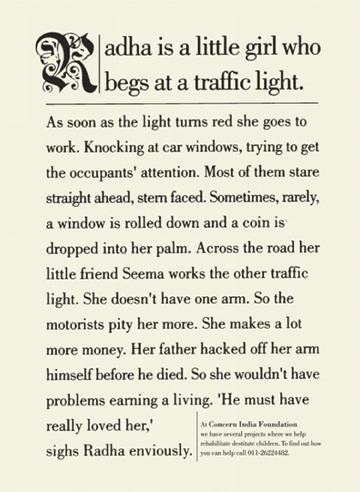
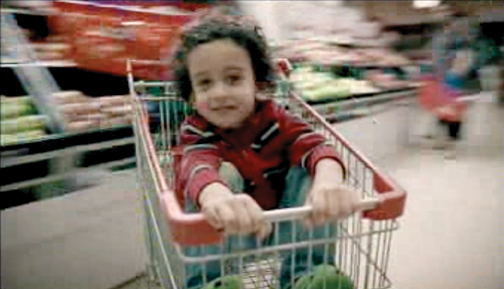
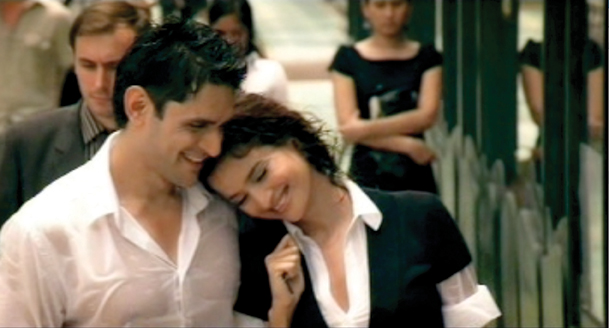
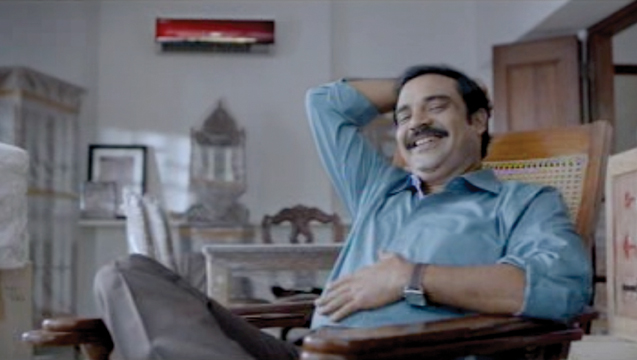
.jpg&h=334&w=500&q=100&v=20250320&c=1)
.jpg&h=334&w=500&q=100&v=20250320&c=1)



.jpg&h=334&w=500&q=100&v=20250320&c=1)
.jpg&h=334&w=500&q=100&v=20250320&c=1)


.jpg&h=334&w=500&q=100&v=20250320&c=1)
